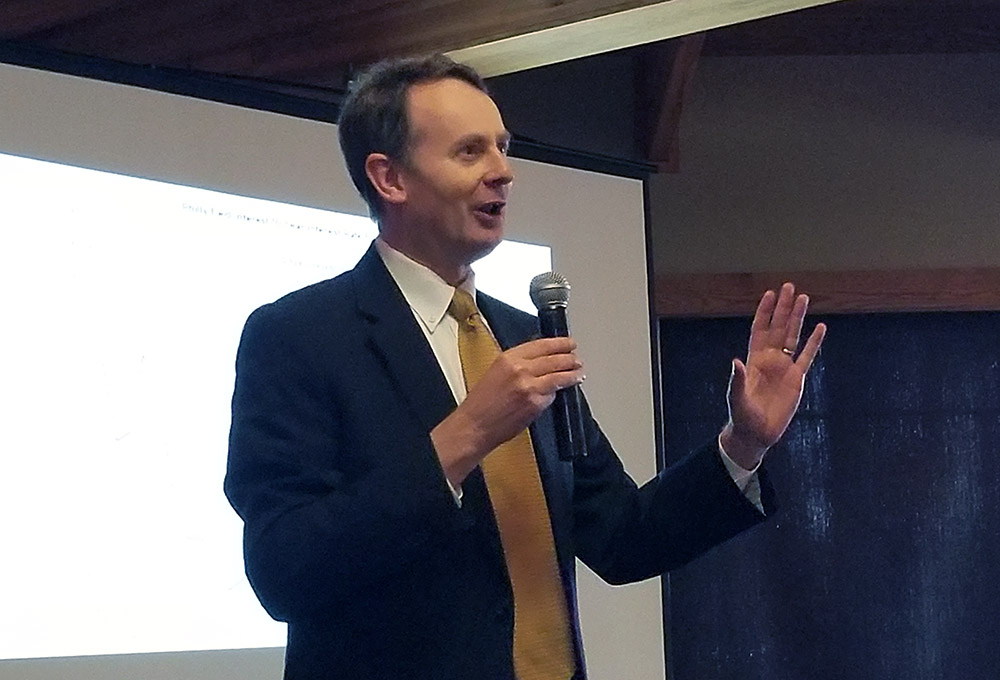
David Barker, speaking at West Bank’s May 1 education forum in Coralville. PHOTO ADAM MOORE
By Adam Moore
adam@corridorbusiness.com
CORALVILLE—The Corridor’s newest member of the Iowa Board of Regents offered his take on what’s ahead for the state’s universities and the local housing economy as part of a recent education forum held at Brown Deer Golf Club.
David Barker, a former Federal Reserve economist and partner with Iowa City-based Barker Companies, officially joined the board on May 1 to begin a six-year term. Speaking to an audience of Corridor business leaders organized by West Bank, Mr. Barker quipped that he’s already been to a meeting disrupted by protestors and voted for a tuition increase at the University of Iowa and Iowa State, “so I’ve already had plenty of interesting experiences there.”
While acknowledging he still has “a huge amount to learn,” Mr. Barker outlined some of the biggest challenges he personally sees facing the state’s educational institutions, including shrinking funding and enrollments, technological changes and polarized politics.
Among the biggest challenge to surmount will be the same problem facing the state’s business community: demographics.
Mr. Barker noted that birth rates declined following the Great Recession, and “that rate hasn’t really recovered much,” meaning that college and universities will be competing for fewer and fewer college-age students in the years to come. At the same time, Iowa and other Midwestern states are facing projections of significant population decline over the next decade, with Iowa projected to lose as much as 15 percent of its people to coastal states and the south.
That means fewer students for the state’s schools, and, as state appropriations continue to erode, fewer tuition dollars to fund the expensive technologies and campus amenities that could draw in students from other states.
“So we have this relationship between funding and enrollment – we need to invest money to attract students to our schools,” he said. “We need to provide better amenities and education to get them. And we need enrollment in order to get those tuition dollars, as we’re depending more and more on tuition to support the university. And so we need to keep that enrollment coming.”
He also noted that politics – in particular, poor management of political crises among the student body and the universities’ leadership – could have the potential to impact enrollments. He suggested that administrators have “done a great job at Iowa with that, and have not had those sorts of problems,” but added that “it’s something we need to be very much aware of.”
Asked for more specifics on what will draw out-of-state students, who pay more in tuition, to Iowa universities, Mr. Barker said the board is “thinking very hard about whether our out-of-state tuition is competitive with other schools.” He added that he thinks it is, when compared to other peer institutions, but that he expects the board to take “a careful look at price and figure out exactly what those elasticities of demand are and what our optimal pricing strategy ought to be.”
He also called for an “honest study” of the economic impact of the University of Iowa, and sharing that information with legislators in Des Moines “to make the case that the university needs funding from the state, and that it’s a good investment.
“There have been studies that have been done before, but it’s easy to buy a study that shows you’ve got a great economic impact,” he added. “Any economist will do that for you and give you any conclusion you want. I think we need to do a really careful and honest job that will convince legislators that if you increase our appropriation by $1, the return to the taxpayer will be more than $1. I think that’s the only way we can make that case.”
Iowa City’s housing hustle
Answering a question about rising apartment vacancies amid a local building boom – illustrated by Coralville City Administrator Kelly Hayworth, who reported that the city has added more than 3,300 housing units since 2015 – Mr. Barker put on his cap as a partner with Barker Companies, which owns and operates rentals throughout Johnson County and the Midwest.
He suggested that some developers had been “a little too aggressive on price,” based on an expanding list of amenities, and are now having to dial back their expectations for rents. But he also said he expects the issue to “even out over time” as the market segments itself into higher- and lower-quality properties.
“There will be competition within that higher-quality group and within that lower-quality group,” he said. “The population of students that are looking at those two may be very different.”
Mr. Barker added that marketing will make all of the difference for landlords fighting to keep units filled as more housing comes online in the metro area.
“It used to be that all you had to do was put an ad in the Yellow Pages and you were full in April for the next fall,” he said. “It’s not like that any more. Landlords who don’t realize that, or who don’t want to invest in new kinds of marketing, are going to see vacancies.” CBJ




